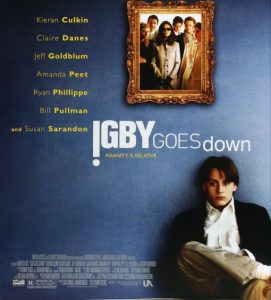
A time-killing, Wes Anderson knock-off at best, a harbinger of things to come in the increasingly intolerable “independent” film scene at worst, Igby Goes Down is a film that tries so hard to be hip and relevant that it ends up alienating any viewer who demands more from cinema than disaffected characters and smart-ass dialogue. Let me come out swinging: I hated this film from start to finish, but I was never as suicidal as during the first thirty minutes of this fiasco. While I make it a point never to walk out of a film (and I’ve sat like an obedient child through The Master of Disguise, so I obviously have a high pain threshold), I was very tempted to do just that as the film neared its halfway point. I was furious in a way that I can only compare to watching George W. Bush speak at any given moment. Yes, I was that pissed.
For those of you who care or insist on a synopsis, the film concerns one Igby Slocumb (Kieran Culkin), a wiser-than-wise young man who hates his mother (played by Susan Sarandon, in a career low performance), manages to get thrown out of several elite schools, and rails against a world that drove his father (Bill Pullman) to an asylum. Igby wants to get his G.E.D., secure his part of the family fortune, and take off on an adventure that involves, I am guessing, an obscenely high degree of navel gazing. And herein lies one of the many problems of the film (just one of dozens, mind you): Are we to sympathize with a young man who hates the world and its oppressive insistence on compromise, yet is only able to have such thoughts because he has lived a life of opulence? His little travels would only be possible because of the money earned by the family he so despises. Whatever happened to hitting the road with only the clothes on one’s back? The hypocrisy is obvious, the annoying-little-shitness even more so.
Along the way, Igby cracks wise, meets a young Jewish woman improbably named Sookie Sapperstein (Claire Danes), sleeps with a drugged-out Amanda Peet (of course!), and hides away in a high-rent property owned by his godfather D.H. Baines (Jeff Goldblum). Making an equally annoying appearance is Sir Ryan Phillippe (as Igby’s older brother Oliver), doing his best to act as if he’s in an episode of Masterpiece Theater. What’s with that voice? And those stilted, William F. Buckley-like mannerisms? How Phillippe has managed to secure even a modicum of fame is something only Ryan and the studio executives he butt-fucked can ever hope to understand.
Given that this is writer/director Burr Steers first film, one can only imagine how many times he sat through the infinitely superior Rushmore to all but plagiarize that work. While he has imitated the style, he has utterly failed to capture the charm, substance, and characterization of Anderson’s film. Steers is content to give us a shell of a film – a carbon copy that is both predictable and pathetic in its desire to appeal to a hip audience that hopefully, might “get it.” Still, Steers does capture one of the more annoying tendencies of Anderson, featured most prominently in the criminally overrated The Royal Tenenbaums – building a world so outside the bounds of reality that it ceases to be interesting.
Unless you are making a sci-fi epic or declare your world as having no connection to a recognizable section of Earth, you are required to present characters and situations that have, at minimum, a remote chance of eliciting audience connection. Maybe I’m wrong on that point, but I am growing intolerant of improbably articulate young people spouting words that could only come from a screenplay scrawled between classes at film school, or the equally infuriating substitution of “colorful” and “eccentric” for any real character depth. Wacky names and bizarre traits are not, contrary to the prevailing coffee house wisdom, inherently interesting.
I have heard it said that this film is The Graduate for a new generation; a tale of alienation and pain and a rebellious resistance to conformity. A key difference – while that film was directed by Mike Nichols, a man with discernable talent, Igby Goes Down was slapped together by an incompetent turd with too much money and obvious industry connections (I’m waiting for the revelation that Burr’s father dines nightly with Harvey Weinstein). The film, among its many failures of plot and character, most offends in the area of tone. It is far too self-satisfied for its own good, almost as if while watching the film, one can hear the director off-screen, mumbling about the genius so apparent in every shot. It is a work of supreme arrogance and smug entitlement, as if daddy had released a young man into the world with his own little toy, only expecting that others be obligated to watch the disaster.